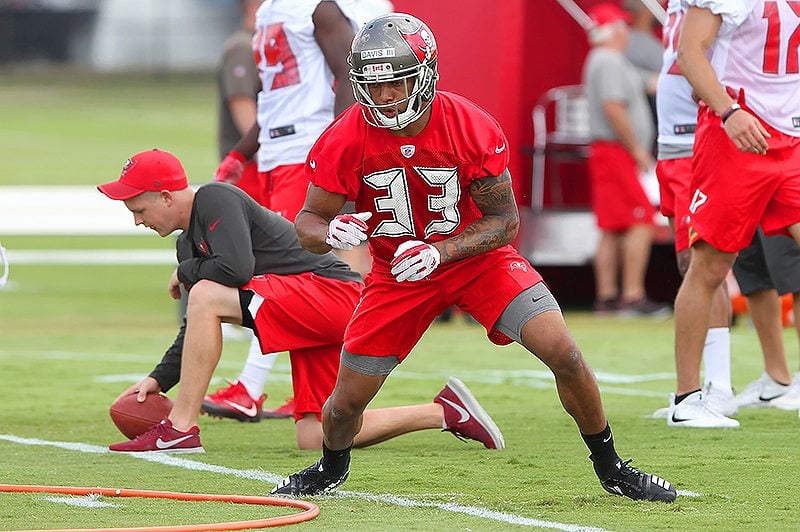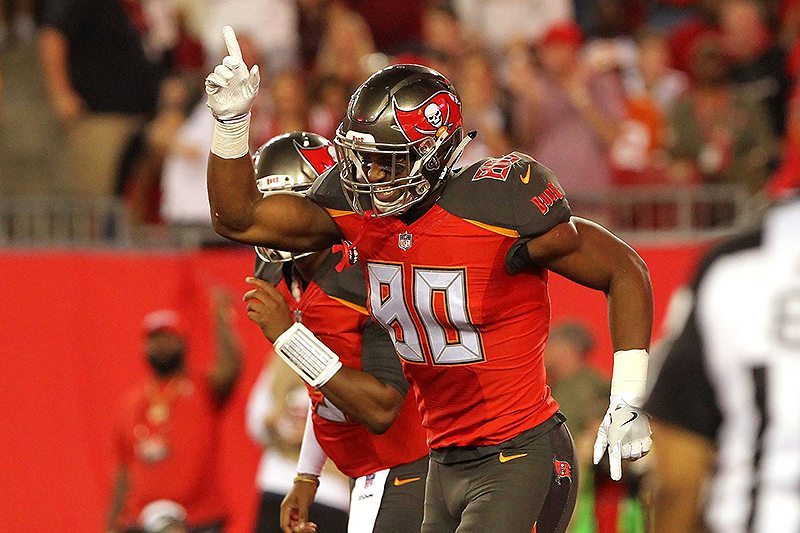FAB 3. Bowers Loved Music More Than Football
Former Tampa Bay Buccaneers defensive end Da’Quan Bowers retired from football this week. The 28-year old Bowers hadn’t played in the NFL since a short-lived stint as an injury replacement with the Bucs in 2015 after they cut him earlier in September.
Bowers was Tampa Bay’s second-round pick in 2011, and most of the national media hailed his drafting as a steal, considering he was projected to possibly be the first overall pick that year prior to having offseason microfracture knee surgery. Concerns about the stability of his knee caused him to slide down into the second round where Tampa Bay drafted him with the 51st overall pick. But there were other non-medical concerns that the Bucs weren’t quite aware of that prompted his draft day slide.
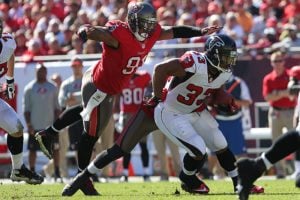
Former Bucs DE Da’Quan Bowers – Photo by: Cliff Welch/PR
After recording 25 tackles, 1.5 sacks and a fumble recovery as a rookie, an Achilles tear shortened his 2012 season to just 10 games where he recorded 13 tackles and a career-high three sacks. In 2013, an out of shape Bowers recorded just seven tackles and one sack as a reserve in the final year of Greg Schiano’s tenure. Bowers struggled to get into shape the next season under Lovie Smith and recorded 21 tackles, 1.5 sacks and one fumble recovery in 11 games.
Bowers’ NFL career was over at age 26 with just 69 tackles, seven sacks and two fumble recoveries to show for it. Hardly the impact Bucs general manager Mark Dominik expected when using the team’s second-round pick on him.
The reason why Bowers was a bust wasn’t physical – despite constantly being out of shape. He was 6-foot-4, 288 pounds, but probably should have been closer to 275. Bowers’ issue wasn’t even mental.
It was heart-related. It turns out that Bowers was more passionate about music than he was football, according to Schiano. He was right.
Bowers’ father was a gospel singer and a member of the Legendary Singing Stars. As he grew older, Bowers himself became a member of the band, playing guitar and occasionally singing lead vocals.
Some teams felt that Bowers’ priority was music over football, and that combined with his offseason knee surgery in 2011 prompted his slide out of the first round. After drafting defensive end Adrian Clayborn in the first round, Dominik grabbed Bowers in the second round because his talent was too good to pass up.
But therein lies the problem.
Talent without passion at the NFL level is a deadly combination in the worst of ways.
I remember watching one of the Bucs’ OTA practices with PewterReport.com’s Mark Cook a few years back. Granted the workouts were voluntary, but after a couple of reps Bowers was winded and opted out when his turn to do some drills came back around. Adrian Clayborn shook his head and jumped in to do double reps. Bowers was constantly struggling to get in shape throughout his Bucs career because he didn’t have the commitment necessary to live up to his talent.
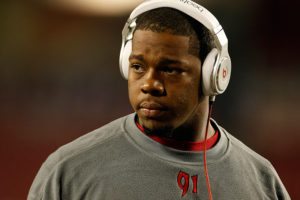
Former Bucs DE Da’Quan Bowers – Photo by: Cliff Welch/PR
Bowers was a one-year wonder at Clemson where he lived off of his superior athleticism, recording 67 tackles, 26 tackles for loss, 15.5 sacks and one interception in 2010, where he was the ACC Defensive Player of the Year, the conference’s leading sacker and the Bronko Nagurski Award winner. The year before as a sophomore, Bowers had 46 tackles, 10.5 tackles for loss and three sacks.
Bowers’ 2010 season was even better than that of former Clemson great Gaines Adams, who was the fourth overall pick in 2007 by Tampa Bay after winning the ACC Defensive Player of the Year award after recording 51 tackles, 16.5 tackles for loss, 12.5 sacks and six pass breakups for the Tigers. But Adams had two very productive years at Clemson, recording 45 tackles, 11 tackles for loss, 8.5 sacks three forced fumbles and five pass breakups as a sophomore in 2005.
The stat sheet and film doesn’t lie, but it also doesn’t tell the full story of a draft prospect, either. That’s where the scouts’ reconnaissance and player interviews can help teams get to the heart of the matter, which is if the draft prospect actually loves football – or merely likes the game because they are good at it and it serves as a meal ticket.
Bowers spent last season in the Canadian Football League with the Edmonton Eskimos where he recorded 17 tackles, seven sacks and an interception in 14 games. In March, he signed a two-year extension with the Eskimos but walked away just two months later when he heard the music calling him, telling him to exchange his helmet for his guitar.
There’s nothing wrong with Bowers liking music, but his lack of passion for football hurt the Buccaneers in the end. That’s a key trait that Tampa Bay general manager Jason Licht and director of college scouting Mike Biehl try to make sure the team’s draft picks have – passion for football.
Biehl travels the country to scout prospects and might visit one college where an ultra-talented player lacks effort and heart and then goes to the next school where a try-hard kid that plays with maximum effort but limited athleticism wishes he had the other player’s athletic gifts.
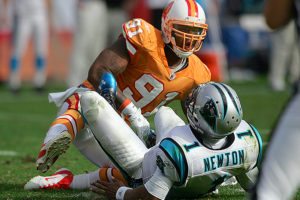
Former Bucs DE Da’Quan Bowers – Photo by: Cliff Welch/PR
“I wish I had it, too,” Biehl said. “It’s hard to see guys not live up to their potential. I think that’s one of the things we’ve honed in on because as an evaluator, it’s hard not to say, ‘He’s talented. We can work with this guy. We can get him to buy into what we are doing.’ That usually doesn’t work like you want it to.
“I think we’ve done a better job of not getting blinded by that and sticking to the kind of guy we want. This year in the draft we really stuck to that and got guys who are just ‘The Buccaneer Way’ – for lack of a better term – competitive guys with passion. But it is frustrating to see guys that have God-given ability and just don’t do anything with it.”
Unfortunately for the Bucs, Bowers’ career hit quite a few sour notes in Tampa Bay.
Scott Reynolds is in his 30th year of covering the Tampa Bay Buccaneers as the vice president, publisher and senior Bucs beat writer for PewterReport.com. Author of the popular SR's Fab 5 column on Fridays, Reynolds oversees web development and forges marketing partnerships for PewterReport.com in addition to his editorial duties. A graduate of Kansas State University in 1995, Reynolds spent six years giving back to the community as the defensive coordinator/defensive line coach for his sons' Pop Warner team, the South Pasco Predators. Reynolds can be reached at: [email protected]

